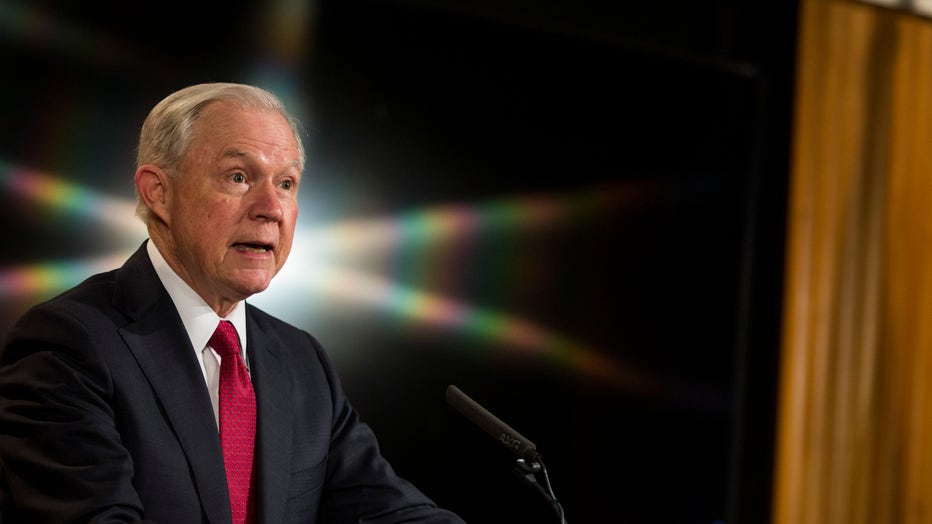Jeff Sessions in hot water over meetings with Russia

U.S. Attorney General Jeff Sessions delivers remarks at the Justice Department's 2017 African American History Month Observation on Feb. 28, 2017 in Washington, D.C. (Photo by Zach Gibson/Getty Images)
By Meg Wagner
‘We are far past recusal’
Republican lawmakers on Thursday demanded that Attorney General Jeff Sessions recuse himself from a federal probe into Russia’s alleged election hacking after he admitted that he twice spoke with Russia’s ambassador — but Democrats want his resignation.
The Justice Department confirmed a Wednesday Washington Post report revealing that Sessions spoke with Russian Ambassador Sergey Kislyak in July and September. Session’s spokeswoman insisted that the meetings were part of the then-senator’s official duties and did not touch on the Trump campaign. Sessions was the first sitting senator to endorse then-candidate Trump, in February 2016, and he campaigned heavily for him through November.
But the timing has raised eyebrows. In the months leading up to the election, Russian officials allegedly hacked Democratic emails and leaked embarrassing information in an effort to help Republican Donald Trump win the White House, U.S. officials have claimed.
House Oversight Committee Chairman Jason Chaffetz (R-Utah) and Senator Lindsey Graham (R-S.C.) have asked Sessions to step aside during the federal investigation into the reported hacking.
But Democrats have demanded more aggressive action. They claim Sessions lied during his Jan. 10 Senate confirmation hearing when he said that he “did not have communications with the Russians” during the campaign.
All Democratic members of the House’s Judiciary Committee signed a letter to the FBI calling for a criminal investigation into the issue, paving the way for prosecutors to levy perjury charges against Sessions.
Other Democrats have called him to step down as attorney general.
“We are far past recusal. Jeff #Sessions lied under oath. Anything less than resignation or removal from office is unacceptable,” House Minority Leader Nancy Pelosi (D-Calif.) tweeted Thursday.
Dozens of other Democratic senators and members of Congress, including Senate leader Chuck Schumer (D-N.Y.) and Sen. Elizabeth Warren (D-Mass.), have called for Sessions’ resignation.
The second Trump staffer to speak with Russia’s ambassador
Sessions is not the first of Pres. Trump’s inner circle to face backlash for his alleged ties to Russia — and he’s not even the first who spoke to Kislyak.
Michael Flynn was forced to resign from his post as Pres. Trump’s national security adviser on Feb. 13 following reports that he spoke with the Russian ambassador in December immediately after the ambassador was informed of the United States' diplomatic reprisals for Russia's alleged election interference.
Some reports alleged that Flynn and Kislyak discussed the Obama administration's sanctions against Russia. The conversations occurred before Trump was inaugurated — meaning that Flynn might have broken an obscure law forbidding private citizens from conducting diplomacy.
The White House has maintained that Flynn was forced out for falsely telling Vice President Mike Pence that the call never happened, not for the call itself.
But members of the Trump campaign and administration have a long, tangled history with Russia. In August, Trump’s campaign chairman Paul Manafort resigned after his time lobbying for Ukraine’s pro-Russia oligarchs came under fire.
It was also reported Thursday that in October, a French think tank run by Russian allies paid Pres. Trump's oldest son, Donald Trump Jr., at least $50,000 to speak at a ritzy dinner.
And just days before Trump's January inauguration, a bombshell 35-page dossier leaked to the media, claiming that the Russian government has been “cultivating, supporting and assisting Trump for at least five years.” Much of the document is unverified, although U.S. investigators have corroborated some of the details.
Possible perjury charges?
So far, the White House has not officially weighed in on Sessions’ actions amid the growing calls for his resignation, although an unidentified White House official defended his talks with the ambassador.
Sessions himself said he’d be willing to recuse himself from the investigation into the Russian hacking — although he has not announced that he plans to do so. As the head of the Justice Department, he would normally play a key role in any possible prosecution.
"I have said whenever it's appropriate, I will recuse myself," he told NBC News. "There's no doubt about that."
But Democrats have demanded much more that recusal. The demand that he be investigated for perjury for allegedly lying to the Senate is especially serious. If tried and convicted, the attorney general could face up to five years in prison.
Sessions’ team has denied accusations that he committed perjury, insisting he was talking about his work on the Trump campaign — not his work as a senator — when he was asked about talks with Russia.

